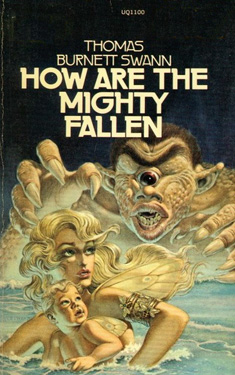Thomas
Burnett Swann
Completed 3/27/2020,
Reviewed 3/27/2020
4 stars
This is a
retelling of the David and Jonathan story as if they were lovers and with some
fantasy thrown in. The question of the
relationship between David and Jonathan has been a matter of speculation, that
it was more than a bromance. Of course,
it is very controversial. Published in
1974, it’s a subtle romance, with more emphasis on the forces around them than
in the details of the relationship. And
it has a rather cold narration, not flowery or overly prosy, but it reads well. It has gods, goddesses, cyclopes (yes, that’s
the plural of cyclops), war, and intrigue.
It packs in a lot for such a short book.
 Jonathan is
the son of King Saul and Ahinoam. But it
turns out that Ahinoam is a siren and a queen from Crete and Jonathan Saul’s
adopted son. The two fled their island
during the onslaught of Goliath, a giant cyclops. They made their way to Israel where she met the
King and married him. Through a tragic
incident, Ahinoam introduces David the shepherd and psalmist to Jonathan. The two young men fall immediately in
love. David is kept in the court by Saul
for his poetry and singing. When Goliath
comes to Israel to fight with the Philistines, Jonathan is fevered, and David
takes up the mantle and slays Goliath with his sling. David becomes a hero. The rest of the story mostly follows the
Biblical tale, with David and Jonathan trying to keep their relationship secret
and pledging themselves to one another.
Jonathan is
the son of King Saul and Ahinoam. But it
turns out that Ahinoam is a siren and a queen from Crete and Jonathan Saul’s
adopted son. The two fled their island
during the onslaught of Goliath, a giant cyclops. They made their way to Israel where she met the
King and married him. Through a tragic
incident, Ahinoam introduces David the shepherd and psalmist to Jonathan. The two young men fall immediately in
love. David is kept in the court by Saul
for his poetry and singing. When Goliath
comes to Israel to fight with the Philistines, Jonathan is fevered, and David
takes up the mantle and slays Goliath with his sling. David becomes a hero. The rest of the story mostly follows the
Biblical tale, with David and Jonathan trying to keep their relationship secret
and pledging themselves to one another.
The story is
well told. I was impressed that the
author was able weave in the subplot of Ahinoam and her background as a siren,
though the full story of how they got to Israel is kind of an info dump. It also goes into detail about Ahinoam’s
patron goddess Ashtoreth and adds some humanity to the Philistines, creating a
more well-rounded social setting.
The
character development is good, but Ahinoam really stands out. She’s an immortal, so she has not aged while
her husband the king has. He does not
divorce her, but he takes a concubine, effectively displacing her. Still, she has figured out how to stay
relevant. She is the envy of Israelite
women and the fantasy of Israelite men.
She is also the only one who knows about David and Jonathan, and
councils them on the beauty of their relationship rather than the Jewish laws
prohibiting it. This is in stark
contrast to Saul, who is losing his mind, and is tortured by Samuel the prophet’s
constant scrutiny.
The narration
is third person and it has a coldness to it.
It’s almost told like a documentary.
As a result, I enjoyed the book tremendously, but didn’t feel particularly
connected to it. This next part is a bit
of a spoiler. The story has a tragic
ending. I thought I would have felt more
at the end than I did. I attribute this
to narrative style.
I give the
book four out of five stars. I didn’t
know much about it going into it. The
cover, while exciting, doesn’t give you any clue that it’s about David and
Jonathan. None of the blurbs tell you
this either. I only knew that it had a
gay relationship in a fantasy setting.
Once I figured out what was really going on, I buried myself in the book
despite the coldness of the prose.
No comments:
Post a Comment